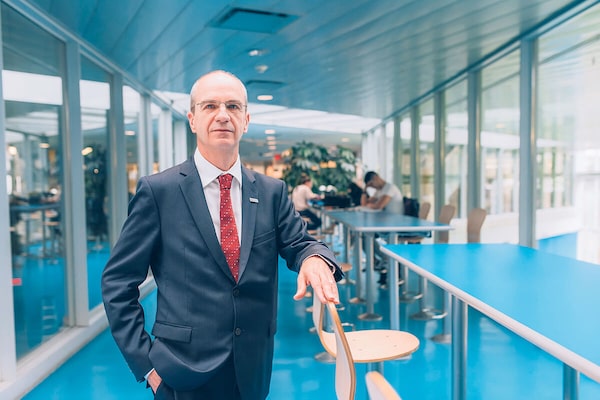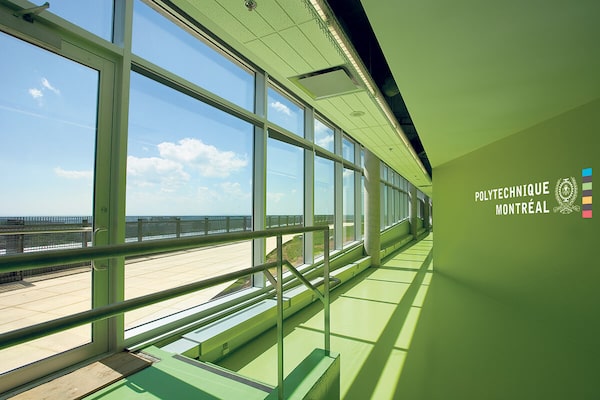
Philippe Tanguy, president at Polytechnique Montréal is dedicated to accelerating efforts for building a sustainable future.CAROLINE PERRON/POLYTECHNIQUE MONTRÉAL
Engineers have a reputation for being able to solve complex challenges – and this means they have a key role in shaping our society. For Philippe Tanguy, president at Polytechnique Montréal, accelerating innovation and advancing a sustainable, circular and low-carbon economy need to be central to the approach.
“Sustainable economic development is quite a buzz word, but it’s more than that. It’s something that is going to deeply modify the way we live and the way we design and build products, services and processes,” he says. “That’s something we take very seriously at Polytechnique Montréal, because we have the mandate to address challenges faced by communities, industry and society – and we want to provide solutions that are not only acceptable but also desirable.”
Accelerating net zero solutions
To accelerate the adoption of clean technologies and environmentally sound practices, Prof. Tanguy recently announced the creation of the Institute on Sustainable Engineering and Net Zero Economy (Institut de l’ingénierie durable et de l’économie carboneutre or IIDEC).”The objective is quite clear; we want to bring the technologies we develop at the university or with our partners to the market,” he says. “We want to create a real footprint.”
The institute will advance the development of a structured and collaborative innovation ecosystem open to all stakeholders in sustainable development across the country. Partners can benefit from the research strengths and expertise at Polytechnique Montréal as well as cutting-edge technological platforms.
A first IIDEC project that promises significant reductions in greenhouse gas emissions builds on a made-in-Quebec technology designed to capture, purify and reuse carbon dioxide (CO2). When the patents of CO2 Solutions – which developed the technology – were acquired by a foreign entity, Polytechnique Montréal took over the pilot equipment.
“We are starting with a CO2 capture platform that is already capable of capturing 10 tonnes of CO2 per day, that’s almost 4,000 tonnes a year. We’re using it as a test bed for commercialization,” says Prof. Tanguy. “The pilot equipment is currently installed in a chemical plant in Montreal, and there are other potential partners who want to decarbonize their emissions in the vicinity.”
In addition to reducing emissions, the captured CO2 can serve as a “raw material” for green technology applications, he notes. “CO2 is often seen as a harmful waste, but it’s also a wonderful molecule that can be converted into methanol for instance. When we look at advancing a circular economy, we need to consider the value of raw materials with a view of green growth.”
Cultivating an ‘environmental mindset,’ enhancing diversity
IIDEC’s goals fit well into Polytechnique Montréal’s broader mandate of providing up-to-date education, and Prof. Tanguy believes this includes developing skills and competencies that enable graduates to make a positive contribution toward “changing the world.
“Today’s students welcome a focus on sustainability,” he says. “This generation has grown up with the environment on their minds, and they are influencing the direction of our programs and research.”
An effort to fully align the university’s research endeavours with sustainable economic development is also underway, according to Prof. Tanguy. “A quick study of the activities of our professors shows that at least 50 per cent of them are directly or indirectly involved in sustainable engineering.”
A new generation of professors is helping to drive this “huge renewal,” he explains. “Over the last two and a half years, we brought on almost 60 new professors, more than a third of them women.”

Polytechnique Montréal’s Claudette-MacKay-Lassonde and Pierre-Lassonde building terraces are the first Canadian university buildings to obtain LEED Gold international environmental certification.PRODUCTION PUNCH/POLYTECHNIQUE MONTRÉAL
For Prof. Tanguy, Engineers Canada’s “30 by 30” goal – to raise the percentage of newly licensed engineers who are women to 30 per cent by the year 2030 – is not ambitious enough. “We are already there at Polytechnique: 30 per cent of our engineering students are women, but ultimately, we want to have 50/50,” he says. “With diversity, you bring different perspectives and fresh ideas. And I mean diversity in general, including women and people with different backgrounds, cultures and experiences. With such a blend, you can create something very fertile.”
Sustainable economic recovery
Innovation has to reach the market in order to have a tangible impact. That’s why IIDEC is creating “capacity to test technology in near-real-world industrial settings,” says Prof. Tanguy. He takes his inspiration from the Fraunhofer-Gesellschaft, a Germany-based applied research organization with a focus on developing key technologies and enabling their commercial application by business and industry.
Similarly, IIDEC plans to implement a collaborative model with the public and private sectors to apply engineering ingenuity to complex challenges. An example is the decarbonization of aviation, a sector that has been hit hard by the economic fallout from COVID-19.
“Economic recovery doesn’t necessarily mean going back to the previous baseline,” says Prof. Tanguy. “We are looking at sustainable alternatives, including green hydrogen, biofuel and electrification. We already have low-carbon fuel options available – we just have to make them [economically viable].”
In addition to investigating hydrogen’s potential in the fields of intensive transport and industry, Polytechnique researchers are looking at the technical and economic issues associated with hydrogen deployment in Quebec, says Prof. Tanguy. “Our capacity to make green hydrogen opens up a whole range of products and applications.”
A collaborative approach to climate action
While sustainability goals typically revolve around conserving natural resources and improving air and water quality, “all products and services around us can benefit from applying the principles of sustainable engineering,” says Prof. Tanguy. “If we want a sustainable life, we also need to look at the quality of information and address things like fake news and cybersecurity threats, for example.”
This broad perspective is reflected in IIDEC’s wide range of topics – which include green energy and chemistry, plastics, water, critical metals and minerals, electrification and decarbonization of transportation, waste management, life cycle impact and social acceptability and more.
“Bringing in societal dimensions is extremely important. We need to ensure our training and research correspond to real-world needs,” says Prof. Tanguy, who adds that “projects involving multidisciplinary teams allow experts from STEM fields to work with social science professionals.”
Beyond that, Polytechnique Montréal also partners with other universities and research institutes – and aims to engage the general public. “More and more citizens want to be actively involved in decisions affecting the future of the city and the province,” he says. “Our society and our provincial government are very supportive of endeavours for advancing a sustainable future, which also bring substantial economic opportunities for Quebec, Canada and the rest of the world.”
Advertising feature produced by Randall Anthony Communications with Polytechnique Montréal. The Globe’s editorial department was not involved.